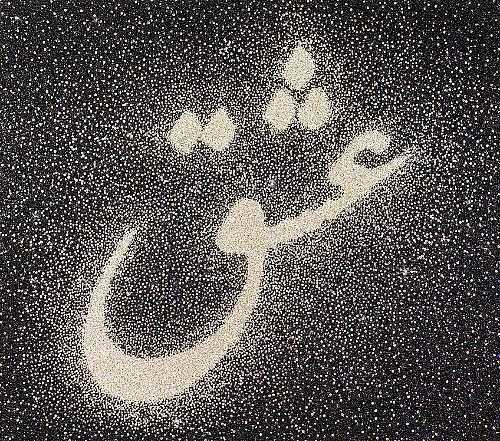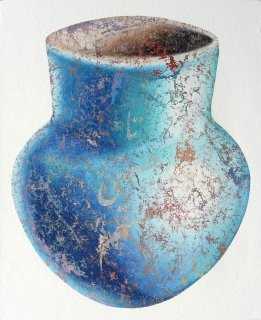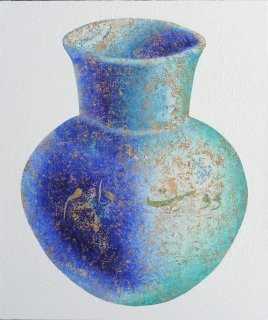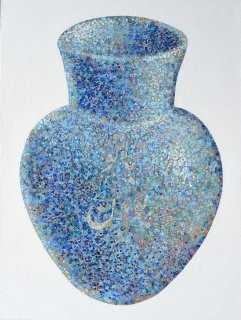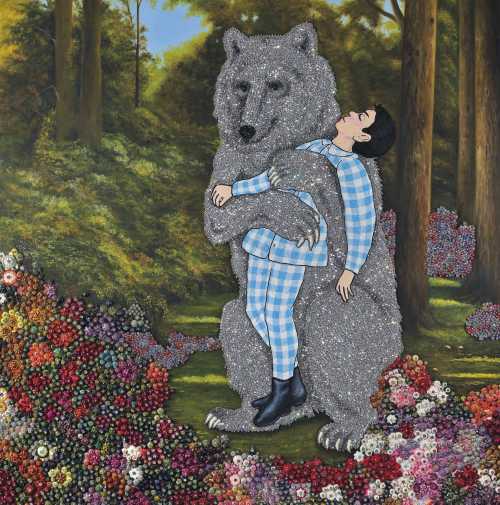- Eshgh (Love) 2007
- Mixed Media on Canvas Laid on Wooden Panel
- Collage & Assemblage
- 176 * 155 * 8 cm
- Signed and dated 2007 on the reverse in Farsi and English
Swarovski crystals and glitter on canvas with acrylic, mounted on mdf
Artwork Description
"A picture is worth a thousand words and a word a thousand pictures."
-Farhad Moshiri
Farhad Moshiri's incredible artistic versatility allows him to draw from both Eastern and Western artistic traditions to produce works whose universality subverts and often scrutinises cultural and indigenous aesthetic biases. Whilst much of Moshiri's work strives for a sense of objectivity in an aim to transcend cultural divides, he nevertheless often casts a critical eye over the anomalies that arise when two opposing cultures converge.
In this painting, Eshgh, the Farsi for love, dominates the canvas in monumental script. A word with universal resonance, the idea of love also has significant symbolic importance in both Eastern and Western cultures. In Iranian culture, the concept of eshgh is central to mystical Sufi tradition, where the love shared between lover and beloved represents the state of union between man and God, a relationship in which love of the divine is a form of euphoric and heavenly intoxication, resulting in an experience which is both sensual and religious. Similarly, the same notion in the Western tradition gives primacy to the Christian ideas of neighbourly and brotherly love, and the love of God for mankind. Clearly then, Moshiri's word of choice is one not only with worldly significance, but one imbued with strong symbolic and metaphysical connotations.
However, despite the purity of the concept of love, Moshiri's depiction of its textual manifestation in bold, bright, crystals casts a cynical eye over the commercialisation of culture in the post-industrial age of mass consumerism. Is the overt outward aesthetic of the image at odds with the innocence and purity of the concept it depicts? Has the idea of love been transfigured purely into an object of visual desire? Moshiri rightly leaves these questions unanswered, underscoring his belief in the subjectivity of perception. Instead, he relates a stunning visual narrative, where the image of love is comprised of thousands of Swarovski crystals, material units which represent the individual human beings that make up the totality of mankind, an entity which is the source and origin of love itself.
An artist whose technical brilliance is matched by his artistic vision, in Eshgh, Moshiri presents us with a vision of love, which is as visually exquisite as it is thoughtful.
-Farhad Moshiri
Farhad Moshiri's incredible artistic versatility allows him to draw from both Eastern and Western artistic traditions to produce works whose universality subverts and often scrutinises cultural and indigenous aesthetic biases. Whilst much of Moshiri's work strives for a sense of objectivity in an aim to transcend cultural divides, he nevertheless often casts a critical eye over the anomalies that arise when two opposing cultures converge.
In this painting, Eshgh, the Farsi for love, dominates the canvas in monumental script. A word with universal resonance, the idea of love also has significant symbolic importance in both Eastern and Western cultures. In Iranian culture, the concept of eshgh is central to mystical Sufi tradition, where the love shared between lover and beloved represents the state of union between man and God, a relationship in which love of the divine is a form of euphoric and heavenly intoxication, resulting in an experience which is both sensual and religious. Similarly, the same notion in the Western tradition gives primacy to the Christian ideas of neighbourly and brotherly love, and the love of God for mankind. Clearly then, Moshiri's word of choice is one not only with worldly significance, but one imbued with strong symbolic and metaphysical connotations.
However, despite the purity of the concept of love, Moshiri's depiction of its textual manifestation in bold, bright, crystals casts a cynical eye over the commercialisation of culture in the post-industrial age of mass consumerism. Is the overt outward aesthetic of the image at odds with the innocence and purity of the concept it depicts? Has the idea of love been transfigured purely into an object of visual desire? Moshiri rightly leaves these questions unanswered, underscoring his belief in the subjectivity of perception. Instead, he relates a stunning visual narrative, where the image of love is comprised of thousands of Swarovski crystals, material units which represent the individual human beings that make up the totality of mankind, an entity which is the source and origin of love itself.
An artist whose technical brilliance is matched by his artistic vision, in Eshgh, Moshiri presents us with a vision of love, which is as visually exquisite as it is thoughtful.
Realized Price
170,648 USD
Min Estimate
100,022 USD
Max Estimate
140,954 USD
Average Artwork Worth
+49.068%
Average Growth of Artwork Worth
Sales Performance Against Estimates
Average & Median Sold Lot Value
2021 - 2025
Performance vs. Estimate
2021 - 2025
Sell-through Rate
2021 - 2025
